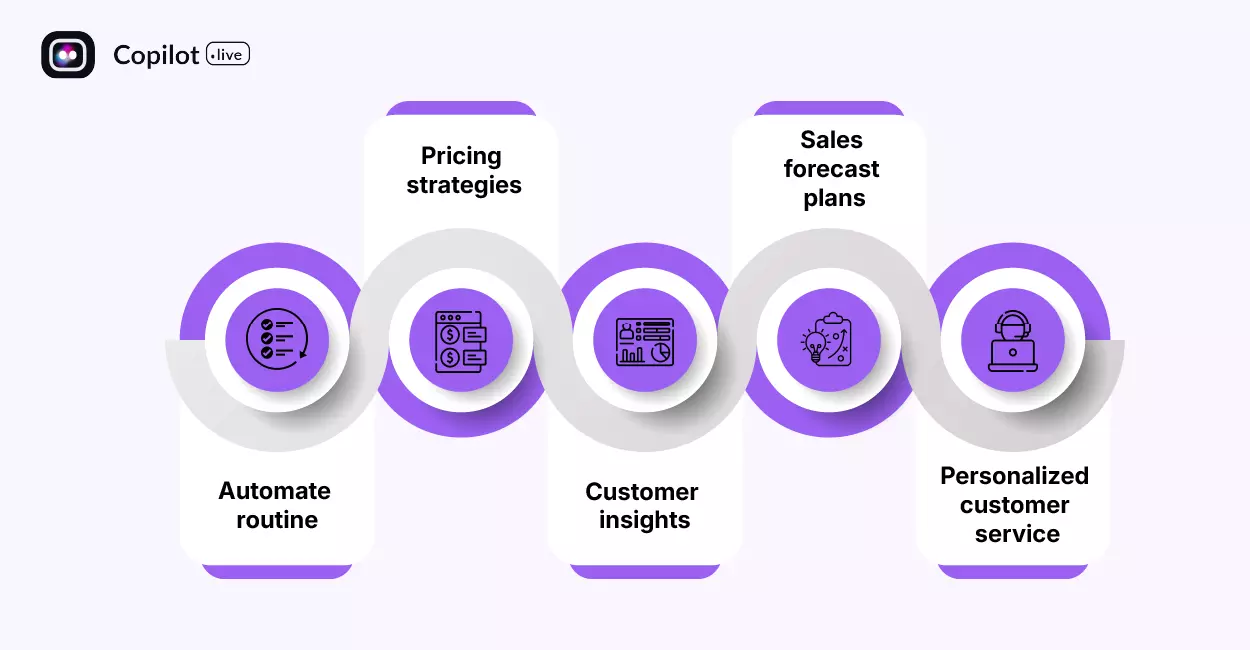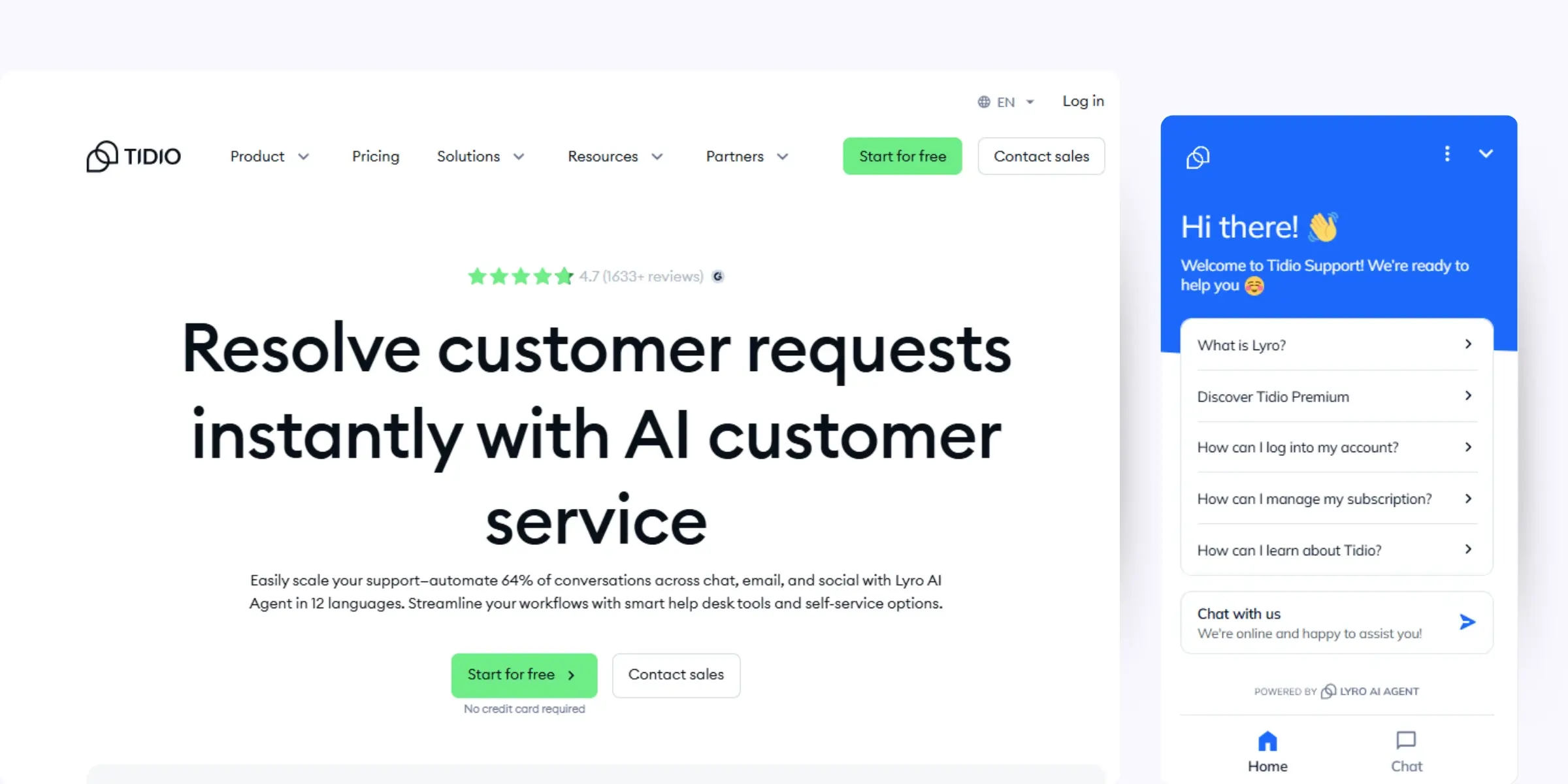Given the deluge of information we are all exposed to virtually every day, it is understandable that some users become disoriented and overwhelmed by the sheer volume of alternatives and content. Selling a product can also be very challenging if you don't know your target market adequately. A chatbot provides a practical and economical answer to each of these problems.
Sales bots have the potential to be incredibly useful when it comes to enhancing the customer experience, increasing sales, and driving customer loyalty and customer satisfaction. But the trick to getting those results is all in how you wield the tools.
Leveraging bots for sales activity increases your sales pipeline velocity when used in a beneficial manner. You can use them to make the buying process smoother, offer instant replies to your customers, and nurture your leads through the sales process.
In this blog, we'll walk you through how to use sales bots and provide you with an overview of their benefits and challenges, and the overall role they play in today’s business scenario.
What is a sales chatbot?
A sales chatbot is an application that uses automated processes to interact with customers and facilitate sales. It does this using prefabricated scripts and/or algorithms to mimic the type of conversations a human would have, answer customer questions, answer questions about a product, and even help them step by step through the sales process.
Sales chatbots can increase customer interaction, free up time for sales reps, and drive leads by qualifying prospects. In particular, for those in sales, a chatbot can help you manage your sales pipeline.
For instance, when a customer is checking out your goods online, the sales bot can emerge and inquire if they require assistance. It gives consumers a reason to engage with the business and lends a helping hand if the consumer needs it.
Compared to support, marketing, and other segments, sales have the maximum chatbot usage percentage, numbering at 41%, with the others being at 37%, 17%, and 5%, respectively.
How do AI chatbots drive sales?
Companies can rest assured that AI-powered chatbots save them time and, therefore, money. Any straightforward conversation handled by a chatbot reduces the number of customer tickets that a live representative must handle. This enables your support staff to devote more time to clients who have more complicated or challenging problems that call for a real person's interpersonal skills.
Here are some ways chatbots with AI capabilities might boost sales and enhance the sales process.
1. Account Prioritization
Sales teams often can’t dedicate personal time to every potential customer—this is why companies use lead qualification to prioritize accounts and maximize the chances of success aligned to their sales objectives. And chatbots can help sales teams qualify accounts as part of this sorting process in opportunity management.
A good chatbot not only qualifies leads but also ensures that only qualified conversations are passed to live agents. Which means your reps only need to engage with prospects that are qualified, interested, and have more complex questions. Implementing a chatbot at the front end of your sales playbook is a great way to color in unfinished puzzle pieces for maximizing rep time and efficiency.
2. Creating customer profiles
There is a lot to learn about your clients from chatbot analytics. While they may not have conversations of great length with your bot, just looking at the channels they came from and using those insights to channel success into your outbound sales and marketing efforts—is useful.
Similarly, if you find most of the chatbot cases that get passed to live agents come from your website, it will be the website channel that your reps will want to stay on top of. Every detail that you track in sales will help you understand and create more accurate customer and prospect profiles.
Benefits of sales chatbots

Businesses may enhance their sales processes, gain a deeper understanding of their clients, and develop effective sales campaigns with the help of AI's untapped potential.
Is that all, though? Obviously not. AI has countless advantages for sales. These are some of the most important benefits that sales chatbots offer when implemented.
1. Automate routine, repetitive tasks to free up human time
Sales chatbots can be very effective at automating repetitive responsibilities. There are so many routine tasks that a company employee performs every single day, such as answering customer questions or FAQs, scheduling, data gathering, and many, many others.
A sales chatbot can automate and manage these tasks with ease. While the human agents or the employees of the particular organization can be left to take care of more crucial and fundamental tasks, such as closing deals or enhancing customer relationships.
2. Optimize pricing strategies
Product pricing is a very sensitive element that needs your attention. Sales chatbots can help you take a snapshot of different market conditions, buying factors, and customer behaviors to price your product accordingly. Sales chatbots will help you optimize pricing strategies as well as test them in the market.
Apart from this, sales chatbots will also allow you to gather enormous amounts of price-related data and extract insights, allowing you to continue to optimize your pricing strategy.
3. Provide better customer insights
The sales chatbots are capable of providing original customer insights by analyzing enormous volumes of data from innumerable yet credible sources. The sales team gains a deeper understanding of the customers thanks to these profound insights.
These insights usually give a detailed idea of what the clients expect, what they like, and how they react to being promoted. This information, in return, helps the sales staff in developing more audience-specific and successful sales tactics.
4. Improved sales forecast plans
Getting your business ready for market demand is essential to supply your products. Sales chatbots have made it easier to evaluate the present market sentiment, industry trends, and past records, and to better train people.
With the help of sales chatbots, you can see the data to visualize future demands. Based on the analysis, you will also be able to develop a sound business model. Which will eventually help you align your team and provide resources as and when required.
5. Ensure personalized customer service
Sales chatbots are increasingly being employed for individualized customer service since they can connect with customers based on their interests and unique information. By updating and changing their profiles depending on previous interactions, sales chatbots can respond to customers in ways that boost customer satisfaction and loyalty.
By offering individualized experiences, these chatbots have the ability to boost customer satisfaction and loyalty, which will eventually propel customer and corporate growth.
What should a chatbot be able to do in sales?
Through intelligent queries and automated and monitored training, chatbots learn with every customer dialogue. A chatbot, which is designed to provide automation in sales, could provide a big added value in connecting CRM and ticket systems.
When a lead has been created, the chatbot sends a notification in the background with all required information to either the salesperson or hands the whole chat to the salesperson during the conversation.
In an ideal scenario, the chatbot is even usable in Facebook Messenger, WhatsApp, and other messenger applications. An AI chatbot should be able to work independently of the browser and with contemporary options such as Chrome, Firefox, or Safari. The function can be utilized fully regardless of the device.
How to use AI chatbots in sales?

Generative AI can be helpful in numerous ways. Some of the top use cases of AI chatbots in sales are listed below in the sections for your reference.
1. Tailored sales recommendations to users
E-commerce websites utilize this extensively to recommend associated products to their consumers. Businesses will use a user’s purchase progression and browsing history to recommend products they believe consumers would be most likely to purchase.
When businesses understand how customers behave and what their history is, they can recommend products that satisfy a user’s expectations. Some of these components would be the user’s preferences, reviews, and reservations.
Example: An example of this is Sephora, a beauty and skincare brand. Sephora worked with its technology partner and saw an opportunity to implement AI. This effort allowed the beauty brand to assist its consumers in making more informed product decisions based on their preferences.
2. Sales analytics and performance management
Sales operations can produce copious amounts of data, and advanced AI can use the data to derive unique insights. Your company can use these insights to enhance your sales team and sales processes.
Example: Takeda Oncology is an example of this type of use of AI. They used an AI-powered app from a bespoke AI app development company to enhance sales and company performance.
3. Automating processes and workflows to gain efficiency
Sales workflows are an integral part of any business. AI can look at the workflows, analyze them, and recommend improvements that enhance sales. Identifying these workflows can also help the business see where there are bottlenecks in processes and, more importantly, where customers are abandoning the process.
Knowing these bottlenecks can improve the sales workflow and increase the chances of closing.
Example: An example of this AI use to automate and improve workflows is Rogers Communications Inc., a telecommunications company. Rogers has used AI to improve sales forecasting, data quality, operational efficiencies, and workflows.
4. Educating the sales team on better sales conversion rates
Another area AI can help is in assisting the sales staff to grapple with the changing nature of sales and customer acquisition. AI can utilize many scenarios and training modules to walk your team through the various nuances in sales.
The potential for the sales team is vast in exploring various sales scenarios and in understanding how to prepare for difficult situations in sales. The outcome would improve the sales process, sales pitches, and customer interactions.
Example: One example is Druva. They used Synthesia.io to train their agents more efficiently and in less time. The brand reduced a lot of training time while training their staff with many improved skills.
5. Demand forecasting to ensure better allocation of resources
Demand forecasting is a vital element of delivering better sales. You can put the necessary resources in place based on the forecast. It is important to have precise forecasts so there is not an oversupply or short supply when you need resources. With AI, accurate demand forecasts can help a company deliver considerable gains in sales.
Example: A good example of this is the Swedish fashion behemoth H&M. The brand employs AI-informed demand forecasting to optimize its supply chain. H&M has more than 200 scientists working on this project to examine trends and purchasing patterns across its stores. After this, it is big data that analyzes customer needs at a local level.
6. Discovering upselling and cross-selling opportunities
Identifying cross-selling and upselling opportunities is yet another compelling use case of AI in sales. Many organizations take advantage of AI's combined analytical capabilities to determine these opportunities.
Example: An insurance brand in South Africa was able to drive potential revenue improvements of 25% by applying AI for cross-selling and upselling. It also helped the brand achieve a 10X improvement across its marketing campaign.
Best practices for chatbots in sales

Some of the best practices to keep in mind while implementing a sales chatbot on your website or in your app are listed below for your reference.
1. Think about conversation quality, not just quantities
You can't simply look at the number of conversations a chatbot runs. Analyze chat transcripts to look at lead quality, customer feelings, and whether the chatbot is directing consumers upward in the sales funnel and towards conversions.
2. Tell users they are talking to a bot
Set realistic expectations by being as transparent as possible; users trust chatbots more when they expect they are talking to one. There is nothing wrong if brands tell users clearly they are talking to a chatbot, and that builds realistic expectations and leads to a smoother experience.
3. Set up follow-up capabilities and multi-channel messaging
A good sales chatbot shouldn't stop at one conversation. Set it up to be able to follow the leads' journeys on email or SMS to nurture the leads and stay aware of where users are in the sales funnel to maintain accuracy across channels.
4. Utilize proactive messaging with tact and thoughtfulness
Don't wait for your clients to inquire. Provide sales brand marketers access to purchase-level data so that they can craft timely, proactive messaging around sales and product suggestions or product reminders. But also be sure to validate and customize messages rather than inundating people with generic information.
5. Design the bot knowing there will be escalation paths
Traditional chatbots, even those that are very smart, cannot deal with every situation. Make sure the transition is as smooth as possible and build the bot to transfer the discussion to a person. Instead of initiating a new conversation with the bot, you want your clients to feel as though they are carrying on from their previous one.
6. Focus on recognizing intentions instead of long scripts
It's better to teach your bot to recognize user intentions than try to map out every conversation flow. This allows for flexibility and more natural responsiveness to conversations that may go off course in a sales conversation.
7. Leverage an agentic AI
If you are building an AI chatbot, create one that utilizes agentic AI. Traditional chatbots hold conversations in a traditional sense, whereas AI agents can act in the interest of those individuals. AI agents can do much more than simply answer questions. They can execute workflows, update records, trigger other processes, and tie into business systems.
8. Relate chatbot actions to sales metrics
Make sure that your chatbot contributes positively towards your important sales objectives, i.e., improving lead qualification rates or decreasing the length of the sales cycle whichever metrics matter. Either directly or indirectly, connect the actions of the chatbot to relevant sales performance and metrics that your team relies on.
List of the top 3 sales chatbots
Figuring out the best sales chatbot for your company might not be an easy task. Keeping in mind all the checklists and finalizing the best would take away your patience and would be a time-consuming task.
That’s why we have prepared for you a list of the top 3 sales chatbots that you can most definitely rely on.
1. Copilot.live
.webp)
With Copilot.live, creating sales chatbots has never been easier or better. Enhance your website's possibilities while automating sales support, up-to-date documentation, and AI-powered assistance that generates conversions.
With Copilot.live, you can automate support, keep your documentation up-to-date, and provide AI-powered assistance that generates conversions. By implementing the Copilot.live sales chatbot, you canan avail yourself of several features, such as advanced AI capabilities, seamless integration, customization, and an overall enhanced customer experience.
Key features
- Copilot.live provides next-level chatbots that can improve your sales process today. Our AI chatbots are designed to improve lead qualification, drive personalized product recommendations, and close sales.
- Effortless integration: Copilot.live allows you to enhance your sales processes while increasing efficiency and creating a better customer experience. Our chatbots allow your sales team to focus on closing the deal while we handle any ongoing lead generation processes.
- With Copilot.live, our chatbots handle most of the repetitive inquiries so your staff can focus on more complex issues to provide quicker and more effective resolutions.
- When you let Copilot.live takes a considerable weight off your support teams' load, you'll experience higher levels of efficiency and customer satisfaction to ensure every customer receives timely, personalized service without the volume overwhelming your support staff.
2. Tidio

Tidio has developed a sales bot powered by AI, natural language processing, and deep learning to help you increase revenues and improve your lead generation. It provides you with 24/7 shopper support and increases your site's engagement, so you can also get more conversions and never miss a sales opportunity again.
Lyro AI Agent, Tidio’s AI chatbot for sales, integrates into existing fintech workflows to improve response time and lessen manual work. Lyro auto-ticketing and team routing are only done where human intervention is required, and it does all of this in the business's brand voice.
Key features
- Collates data about the potential customers when they are navigating through the website.
- Helps recover abandoned carts by popping up at just about the correct time and sends product bundles automatically.
3. Drift

Drift is a revenue acceleration platform that provides live chat for sales and AI-powered chatbots, which help engage your visitors in more natural conversations instead of one-way contact form applications.
Key features
- Live chat for sales through Drift increases conversions because they are able to meet their leads at the peak of their interest and in just the right contextual environment.
- Your SDRs are also more agile and able to use sales techniques such as calendar invites, recording custom walkthroughs, or sending video case studies, the faster they can convert.
Steps to create a sales chatbot
At Copilot.live, the process to create a sales chatbot usually requires 4 major steps that include navigating to the website and signing up for free, naming and designing your chatbot, training, and finally testing and deploying your sales chatbot. However, if you want to know more about the process to build your sales chatbot, you can visit us at Copilot.live.
Challenges of sales chatbots

While the opportunities for the use of generative AI in sales are many, there are also many challenges that face businesses that are attempting full integration of AI into their sales processes. Here are some challenges to be mindful of and to address.
1. Ethics and AI bias
AI systems can sometimes exhibit bursts of bias toward the training data. When data bias exists, the systems can produce unfair and discriminatory outcomes. Hence, fairness and bias embedding are very real challenges that will require your organization to consider solutions.
2. Accurate, high-quality data challenges
AI models depend on high-quality, accurate data to operate properly. Low-quality data could lead to faulty insights and cause the model to lose its worth to the company. You need to take this into consideration before implementing AI in any part of your operations, including sales.
3. Challenges with scaling AI-enabled systems
The AI solutions you choose should be scalable in flavor at some point in the future as you begin to grow your business. Challenging that growth and the same future's growth could be its increased data processing demands and costs, as well as operational awareness to properly manage and deliver quality-based insights. You can also prepare for change for the growth ahead.
4. High cost of technology and computations
The cost of technology, infrastructure (both physical and moral), talent, and training can be pretty substantial when implementing AI. Smaller businesses may struggle to absorb this cost. Take time to look at your investments to decide if you will be okay with handling the potential upheaval.
5. Selecting the right tool from a plethora of tools
There are so many AI tools; how do you select the right tool for your needs? You need to be sure that the technology you choose will support your business aims and goals as they relate to your existing technology stack. So, don't rush to pick a tool.
AI-driven sales automation
Automating sales with AI tools is a key aspect of using AI for sales in any organization. With the use of AI, you are enabling the creation of automated pathways. You set up these pathways based on sales goals and expectations.
Some of the key reminders to introspect while using AI to automate sales are listed below for your reference.
- The first thing to do is understand your requirements. By understanding these, you will know what is automatable and what isn't.
- There are many AI automation tools that exist in the marketplace. You can work with one of these organizations or find an AI development agency to develop a tool for you.
- Choosing the tools for AI-enhanced automation is only half of the story. The second half is that you might need to adapt them for your needs and technology ecosystem.
- You need to train the team to effectively use the automation process to maximize the outcome. There will be pushback, but your training needs to address it.
- You must manage the customer experience at all customer touchpoints. Make sure it is human, seamless, and personalized for all customers/prospects.
- Track the activity of the AI workflow. The tracking allows you to quickly determine and address bottlenecks to optimize sales efficiencies.
Conclusion
AI has a tremendous future in sales. However, properly deploying AI components to existing sales systems, processes, and workflows must be accomplished carefully and methodically. In your move toward integrated AI, remember to integrate human experience and involvement. After all, you sell to human customers who must engage with human experience. You will need to create a strategy to effectively use AI in sales.










